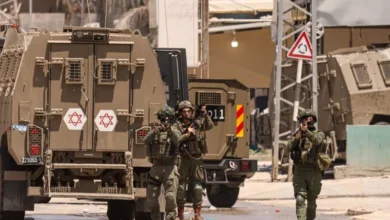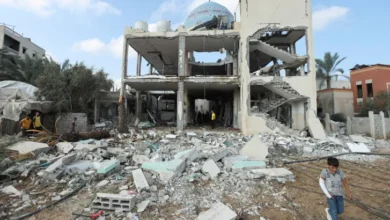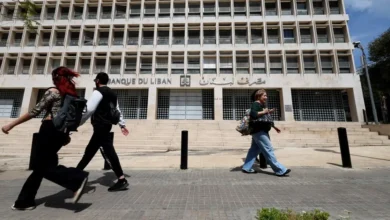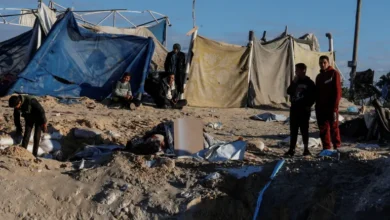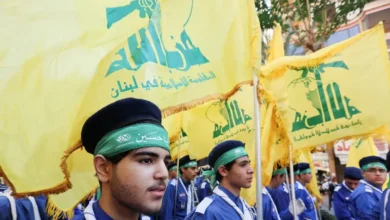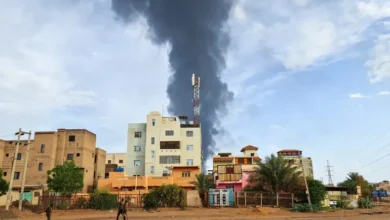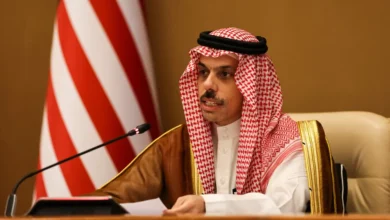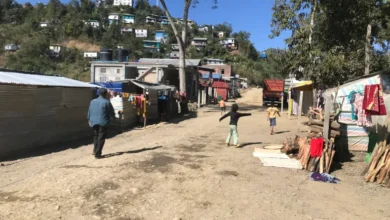In a flash, Melissa Joudah lost 60 family members and use of her legs
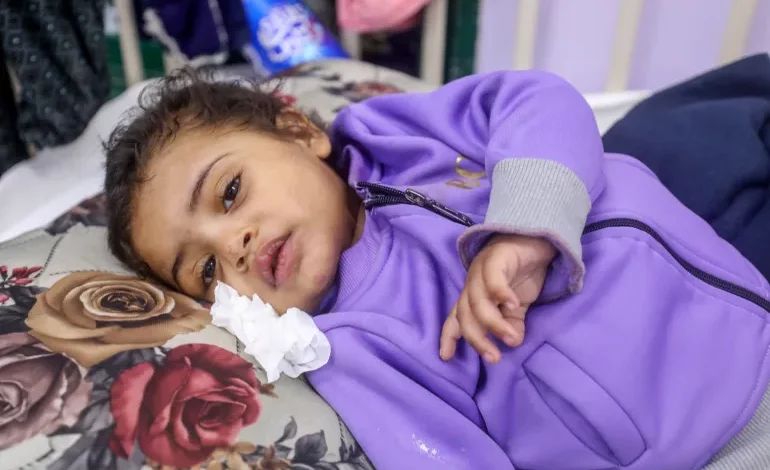
About 4am one night during the second week of Israel’s bombardment of Gaza, Yasmeen Joudah woke up to her mobile phone ringing nonstop.
Astounded, she realised that people were calling to offer their condolences over the killing of her entire family.
Horrified, she ran through the pre-dawn streets to where her parents’ home once stood and flung herself on the rubble, scrabbling through the shattered concrete with her bare hands.
The Joudahs had been asleep when an Israeli missile targeted their four-level home, burying dozens of them underneath the rubble.
Yasmeen looked around helplessly as body after body was pulled out from under the rubble.
Then 16-month-old Melissa, her sister’s cheerful daughter who had just taken her first steps weeks earlier, was pulled out, completely still and quiet. Everyone assumed she was dead.
Shrapnel from the Israeli air attack had lodged in Melissa’s spinal cord, paralysing her from the chest down.
Weeks later, Yasmeen’s grief wavers in her voice, her tears spilling down her face.
“Everyone is gone,” she said, speaking from inside the Al-Aqsa Martyrs Hospital. “All five of my siblings were killed. My mother. My two aunts. Their daughters, their sons. My brother-in-law.
“I want them back. Bring them back to me,” she sobbed.From her immediate family, Yasmeen counted 32 members killed, most of them women. Melissa’s father, his parents, his sisters and their children were also killed, bringing the total to 68 members of the Joudah family.
Grim future
Melissa desperately needs medical treatment abroad, according to the head of the orthopaedic department at Al-Aqsa Martyrs Hospital.
“She has multiple pieces of shrapnel wedged in the T12 vertebra, as well as fractures in her spinal cord,” Dr Ayman Harb said, adding: “Unfortunately this means that she cannot use her lower extremities.”
“The little girl is physically stable, in the sense that she is paralysed from the chest down,” he continued. “But physiotherapy and moral support should be the next step.”
Harb pointed out that because shrapnel remains in Melissa’s body, she could be at risk of infection and complications, which could in turn lead to multiple organ failure.
“We’re working on cases now what we’ve never seen in our medical textbooks,” he said, adding that, so far, he has had 12 patients who were paralysed by Israeli attacks.
Asked about Melissa’s chances, Harb was pessimistic.
“Her future will be one of suffering,” he said bluntly. “She will spend the rest of her life in a wheelchair.”
The hospital, like the rest of the medical facilities still operating in the Gaza Strip, is barely functioning on solar-powered generators and sorely lacks medical supplies and personnel.
Al-Aqsa Martyrs is not a large central hospital like al-Shifa Hospital in Gaza City, which is currently under attack by the Israeli army. It was built to serve only the town of Deir el-Balah and has only 16 doctors.
Regardless, because of the ongoing offensive, its patient population has swollen, and it has had to treat many times more patients than its capacity.
“We don’t have time to cry when we see patients whose lives are ruined,” Harb said. “Every day we operate on 30 major cases plus 15 minor ones from 8am until 3am.”
‘All I have left’
Melissa’s mother had been nine months pregnant. The Associated Press reported that she had gone into labour during the attack and was found dead beneath the rubble, the heads of her lifeless twins emerging from her birth canal.
The Israeli offensive has killed more than 11,000 Palestinians, 8,000 of them children and women. Since the Israeli attacks on hospitals in the northern Gaza Strip have intensified, leading to the collapse of services and communications, the death toll was not updated for on Friday and Saturday.
According to Ismail Thawabta, the director general of the government media office, 11,180 Palestinians, including 4,607 children, have been killed so far.
More than 3,000 people remain under the rubble, including 1,700 children, he added, speaking at a press conference on Sunday.
Melissa, who is now home with her aunt Yasmeen in Deir el-Balah, is waiting to get approval to leave Gaza through the Rafah border crossing with Egypt to get further medical treatment.
“I will put her in my heart,” Yasmeen said. “She’s all I have left.”
She also has one other wish: “I want Melissa to walk. I don’t know how she will live.”
